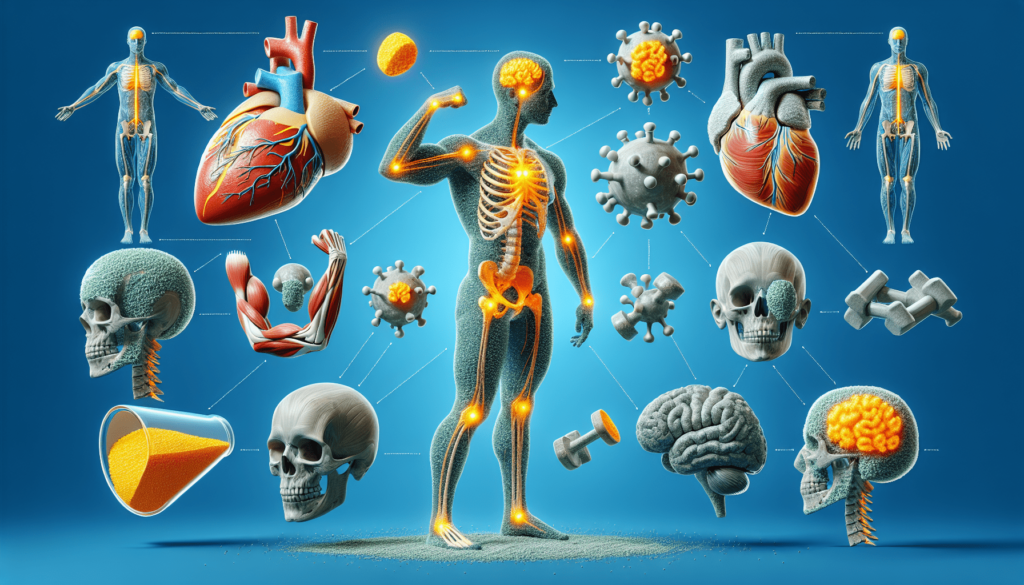Did you know that calcium is not just important for bone health? In fact, this essential mineral plays a crucial role in many other functions in your body. From maintaining a healthy heart and regulating muscle contractions to supporting nerve function and aiding in blood clotting, calcium is truly a multitasking superstar. So, it’s time to give this mineral the credit it deserves and discover why calcium is more than just bone health.

Calcium and Its Importance
Calcium as a vital mineral
Calcium is a vital mineral that plays numerous important roles in the body. While many people associate calcium primarily with bone health, its benefits go beyond just that. Calcium is necessary for healthy nerve function, proper muscle contraction, and blood clotting. It also supports heart health, dental health, and weight management. Ensuring an adequate intake of calcium is crucial for overall health and well-being.
Calcium’s role in bone health
One of the most well-known roles of calcium is its contribution to bone health. Calcium is a key component of bone structure, providing strength and durability. It not only helps in building strong bones during childhood and adolescence but also in maintaining bone health in adulthood. Adequate calcium intake throughout life can reduce the risk of osteoporosis, a condition characterized by weakened and brittle bones.
Calcium’s impact on nerve function
Calcium is essential for optimal nerve function. It assists in the transmission of nerve impulses, allowing for the smooth communication between the brain and various parts of the body. Without sufficient calcium, nerve signals may become disrupted, leading to issues such as numbness, tingling sensations, and muscle cramps.
Calcium’s involvement in muscle contraction
Muscle contraction is another area where calcium plays a vital role. When a muscle receives a signal to contract, calcium ions are released, which allow the muscle fibers to slide over one another, resulting in the desired movement. Without adequate calcium, muscles may not contract properly, leading to muscle weakness, spasms, and even difficulty in performing everyday tasks.
Calcium Sources
Dairy products
Dairy products are one of the richest sources of dietary calcium. Milk, cheese, and yogurt contain high amounts of calcium that are easily absorbed and utilized by the body. Incorporating these dairy products into your diet can significantly contribute to meeting your daily calcium requirements.
Leafy green vegetables
Leafy green vegetables, such as kale, spinach, and broccoli, are excellent plant-based sources of calcium. While the calcium content in these vegetables may be slightly lower than that of dairy products, they are still a valuable addition to a calcium-rich diet, especially for those who follow a vegetarian or vegan lifestyle.
Soy products
Soy products, such as tofu and soy milk, can also provide a good amount of calcium. Additionally, they offer the benefits of being low in saturated fat and cholesterol, making them a healthy alternative to traditional dairy products for individuals with dietary restrictions or preferences.
Fish with edible bones
Certain types of fish, such as salmon and sardines, contain edible bones that are a great source of calcium. These small, soft bones are easy to consume and provide an additional nutritional boost along with the fish’s other health benefits, such as omega-3 fatty acids.
Calcium-fortified foods
Many foods, including cereals, bread, and orange juice, are fortified with calcium to enhance their nutritional value. These fortified foods can be a convenient way to increase your calcium intake, especially if you have dietary restrictions or find it challenging to consume enough calcium-rich foods.
Calcium Absorption and Vitamin D
The role of vitamin D in calcium absorption
Vitamin D plays a crucial role in calcium absorption in the body. When calcium is consumed through the diet or supplements, vitamin D helps to stimulate the synthesis of calcium-binding proteins, which facilitate the absorption of calcium from the intestine into the bloodstream. Without sufficient vitamin D, calcium absorption may be impaired, leading to a potential deficiency.
Factors that enhance or inhibit calcium absorption
Several factors can affect the absorption of calcium in the body. Factors that enhance calcium absorption include an adequate intake of vitamin D, stomach acid production, and certain dietary components like lactose and protein. On the other hand, substances such as oxalates, phytates, and excessive dietary fiber can inhibit calcium absorption. It’s important to consider these factors when planning your diet to ensure optimal calcium absorption.
The importance of sunlight exposure
Sunlight exposure is crucial for the synthesis of vitamin D in the body. When the skin is exposed to sunlight, it produces vitamin D, which plays a vital role in calcium absorption. Spending time outdoors and allowing your skin to be exposed to sunlight can help maintain sufficient vitamin D levels and support calcium absorption.
Calcium Deficiency and Risk Factors
Signs and symptoms of calcium deficiency
Calcium deficiency, also known as hypocalcemia, can lead to various signs and symptoms. These may include muscle cramps, numbness or tingling sensations, weak and brittle nails, thinning hair, and frequent fractures. In severe cases, calcium deficiency can result in osteoporosis, impaired nerve function, and abnormal heart rhythms.
Groups at higher risk of calcium deficiency
Certain groups of people are at higher risk of calcium deficiency. These include individuals who follow a vegan or lactose-free diet, those with lactose intolerance, postmenopausal women, older adults, and people with medical conditions that affect calcium absorption, such as Crohn’s disease or celiac disease. It is essential for these individuals to pay extra attention to their calcium intake and consider supplementation if necessary.
The long-term impact of calcium deficiency
Long-term calcium deficiency can have serious consequences for health. Inadequate calcium intake over time can lead to weak and porous bones, increasing the risk of fractures and osteoporosis. Calcium deficiency can also contribute to cardiovascular problems, nerve disorders, and impaired muscle function. Therefore, it is crucial to ensure an adequate intake of calcium throughout life to prevent these long-term complications.

Calcium and Disease Prevention
Osteoporosis and calcium
Osteoporosis is a condition characterized by low bone density and increased bone fragility. Adequate calcium intake, along with other bone-healthy nutrients like vitamin D and magnesium, is essential for preventing osteoporosis. By ensuring that you consume enough calcium-rich foods or supplements, you can reduce the risk of developing this debilitating condition, particularly as you age.
Hypertension and calcium
Calcium has been associated with helping to lower blood pressure levels. Adequate calcium intake, combined with a well-balanced diet and a healthy lifestyle, may contribute to the prevention and management of hypertension. However, it is important to note that excessive calcium intake through supplementation does not necessarily provide additional blood pressure-lowering benefits and may even have adverse effects.
Colon cancer and calcium
Research suggests that an increased intake of calcium, particularly from dietary sources, may help reduce the risk of developing colon cancer. Calcium’s mechanisms in preventing colon cancer are still being studied, but studies have shown promising results. It is recommended to obtain calcium from a well-rounded diet rather than relying solely on supplements.
Premenstrual syndrome (PMS) and calcium
Calcium has been found to play a role in reducing the symptoms of premenstrual syndrome (PMS). Consuming sufficient calcium during the menstrual cycle can help alleviate symptoms such as mood swings, irritability, and bloating. Including calcium-rich foods in your diet may be an effective natural approach to manage PMS symptoms.
Calcium Supplements
Types of calcium supplements
Calcium supplements are available in various forms, including calcium carbonate, calcium citrate, and calcium phosphate. Each type has different absorption properties and may be more suitable for certain individuals based on factors such as age, digestive health, and the presence of other medical conditions. It is recommended to consult a healthcare professional before starting any calcium supplementation regimen.
Effectiveness and safety of calcium supplements
Calcium supplements can be effective in filling dietary gaps and ensuring sufficient calcium intake, especially for individuals who struggle to meet their calcium needs through food alone. However, it is important to note that excessive intake of calcium supplements without medical supervision can lead to adverse effects, such as kidney stones or mineral imbalances. It is always best to consult with a healthcare professional to determine the appropriate dosage and any potential risks associated with supplementation.
Recommendations for calcium supplementation
The recommended daily intake of calcium varies based on age, sex, and life stage. It is generally advised that adults aim for 1000-1300 milligrams of calcium per day, depending on their individual needs. While dietary sources should be the primary approach to meet calcium requirements, supplementation may be necessary for individuals with inadequate dietary intake or increased calcium needs due to certain medical conditions. It is important to consult with a healthcare professional to determine the appropriate dosage and form of calcium supplementation based on your individual circumstances.
Calcium’s Role Beyond Bone Health
Calcium and weight management
Calcium has been suggested to play a role in weight management. Some research studies have found a potential link between higher calcium intake and a lower risk of obesity and overweight. While the exact mechanisms are not fully understood, it is believed that calcium may help regulate appetite, fat storage, and metabolism. Incorporating calcium-rich foods into a balanced diet, alongside regular physical activity, can contribute to maintaining a healthy weight.
Calcium’s effect on blood clotting
Calcium plays a crucial role in the process of blood clotting, also known as coagulation. When an injury occurs and a blood vessel is damaged, calcium helps activate a series of reactions that lead to the formation of a blood clot, stopping excessive bleeding. Adequate calcium levels are essential for the proper functioning of this coagulation process and ensuring normal blood clotting.
Calcium and dental health
Calcium is essential for maintaining strong teeth and preventing tooth decay. Calcium, along with phosphorus, helps build and strengthen tooth enamel, the outer protective layer of teeth. It also helps maintain the proper pH balance in the mouth, reducing the risk of acid erosion and tooth demineralization. Adequate calcium intake is necessary for preserving dental health and preventing oral health problems.
Calcium’s relationship to heart health
Calcium also plays a role in heart health. It is involved in regulating the contraction and relaxation of the heart muscles, as well as maintaining normal heart rhythm. Low calcium levels can disrupt these processes and potentially contribute to the development of heart-related conditions. However, it is important to note that excessive calcium intake through supplementation has not been shown to provide cardiovascular benefits and may even pose a risk, particularly in individuals with certain heart conditions.
Calcium-rich Recipes
Mango kale smoothie
Ingredients:
- 1 cup of kale leaves (stems removed)
- 1 ripe mango (peeled and chopped)
- 1 cup of Greek yogurt
- ½ cup of almond milk (or any milk of your choice)
- 1 tablespoon of honey (optional)
Instructions:
- Place all the ingredients in a blender.
- Blend until smooth and creamy.
- Taste and adjust sweetness if desired by adding honey.
- Serve and enjoy this refreshing and calcium-rich smoothie!
Broccoli and cheese stuffed chicken
Ingredients:
- 4 chicken breasts
- 2 cups of steamed broccoli (chopped)
- 1 cup of shredded cheddar cheese
- 2 cloves of garlic (minced)
- Salt and pepper to taste
Instructions:
- Preheat your oven to 375°F (190°C).
- Cut a slit in the side of each chicken breast to create a pocket.
- In a mixing bowl, combine the steamed broccoli, cheddar cheese, minced garlic, salt, and pepper.
- Stuff each chicken breast with the broccoli and cheese mixture, securing with toothpicks if needed.
- Place the stuffed chicken breasts in a baking dish.
- Bake for 25-30 minutes or until the chicken is cooked through.
- Remove the toothpicks before serving.
- Enjoy this delicious and nutritious meal packed with calcium and other essential nutrients!
Salmon with lemon-dill sauce
Ingredients:
- 4 salmon fillets
- 2 tablespoons of fresh dill (chopped)
- Juice of 1 lemon
- Salt and pepper to taste
For the lemon-dill sauce:
- ½ cup of Greek yogurt
- 1 tablespoon of fresh dill (chopped)
- Juice of ½ lemon
- Salt and pepper to taste
Instructions:
- Preheat your oven to 400°F (200°C).
- Season the salmon fillets with salt, pepper, chopped dill, and lemon juice.
- Place the seasoned salmon fillets on a baking sheet lined with parchment paper.
- Bake for 12-15 minutes or until the salmon is cooked to your desired doneness.
- While the salmon is baking, prepare the lemon-dill sauce by mixing together Greek yogurt, fresh dill, lemon juice, salt, and pepper in a small bowl.
- Serve the cooked salmon with the lemon-dill sauce drizzled on top.
- Enjoy the flavorful combination of salmon, dill, and lemon while benefiting from the calcium and omega-3 fatty acids found in salmon!
Spinach and feta frittata
Ingredients:
- 6 large eggs
- 1 cup of fresh spinach leaves (chopped)
- ½ cup of crumbled feta cheese
- ½ onion (chopped)
- 1 clove of garlic (minced)
- Salt and pepper to taste
- Olive oil for greasing
Instructions:
- Preheat your oven to 375°F (190°C).
- In a mixing bowl, beat the eggs and season with salt and pepper.
- Heat a non-stick skillet over medium heat and add olive oil.
- Add the chopped onion and minced garlic, and sauté until translucent.
- Add the chopped spinach and cook until wilted.
- Reduce the heat to low and pour the beaten eggs over the spinach and onions.
- Sprinkle the crumbled feta cheese evenly over the egg mixture.
- Cook on the stovetop until the edges are set.
- Transfer the skillet to the preheated oven and bake for 12-15 minutes or until the frittata is cooked through and slightly golden.
- Remove from the oven and let it cool slightly before slicing and serving.
- Enjoy this calcium-rich frittata as a delicious and nutritious breakfast or brunch option!
Greek yogurt parfait
Ingredients:
- 1 cup of Greek yogurt
- 1 cup of mixed berries (strawberries, blueberries, raspberries)
- ¼ cup of granola
- 1 tablespoon of honey (optional)
Instructions:
- In a glass or bowl, layer Greek yogurt, mixed berries, and granola.
- Repeat the layers until all ingredients are used.
- Drizzle honey on top if desired for added sweetness.
- Serve and enjoy this simple and calcium-packed snack or breakfast option!
Calcium and Dietary Guidelines
Recommended daily intake of calcium
The recommended daily intake of calcium varies based on age, sex, and life stage. For adults aged 19-50, the recommended intake is 1000 milligrams of calcium per day. However, for individuals over 50, the recommendation increases to 1200 milligrams per day. It is important to note that these recommendations may vary for specific populations and individuals with certain health conditions. Consulting with a healthcare professional can provide personalized guidance on calcium intake.
Calcium intake for different age groups
The calcium needs vary across different age groups. Infants aged 0-6 months require 200 milligrams of calcium per day, while those aged 7-12 months need 260 milligrams. Children aged 1-3 years require 700 milligrams, and children aged 4-8 years need 1000 milligrams. Adolescents aged 9-18 years have higher requirements, with boys needing 1300 milligrams and girls needing 1300-1500 milligrams per day.
Tips to increase calcium consumption
Incorporating calcium-rich foods into your daily diet can help increase your calcium consumption. Here are some tips to help you meet your calcium needs:
- Include dairy products such as milk, cheese, and yogurt in your meals and snacks.
- Choose calcium-fortified plant-based milk alternatives if you are lactose intolerant or follow a vegan lifestyle.
- Add leafy green vegetables like kale, spinach, and broccoli to your salads, stir-fries, and smoothies.
- Opt for calcium-set tofu or tempeh as a plant-based source of calcium.
- Include fish with edible bones, such as salmon and sardines, in your diet.
- Incorporate calcium-fortified foods like cereals and orange juice into your breakfast routine.
- Consider cooking with calcium-rich herbs and spices, such as thyme, oregano, and cinnamon.
- Experiment with calcium-rich recipes like the ones mentioned earlier in this article.
- Consult with a registered dietitian or healthcare professional for personalized advice on meeting your calcium needs.
Conclusion
Calcium is a truly multifaceted mineral that goes beyond just bone health. Its importance cannot be understated, as it plays crucial roles in nerve function, muscle contraction, blood clotting, and various aspects of overall health. Incorporating calcium-rich foods in your diet is essential to ensure an adequate intake. From dairy products to leafy green vegetables, there are numerous sources of calcium to choose from. Vitamin D also plays a pivotal role in calcium absorption, emphasizing the importance of sunlight exposure. Understanding the risks of calcium deficiency and the long-term impact it can have on health is crucial for prevention. Calcium also plays a significant role in disease prevention, including osteoporosis, hypertension, colon cancer, and premenstrual syndrome. While supplements can be an option, it is important to consider their effectiveness and safety, as well as consult with a healthcare professional. Calcium’s benefits go beyond bone health, as it can positively influence weight management, blood clotting, dental health, and heart health. Enjoying calcium-rich recipes can be a delicious way to incorporate this vital mineral into your daily life. Following dietary guidelines and seeking healthcare advice for individual needs will help ensure sufficient calcium intake. Remember, calcium is more than just bone health – it is a key player in overall well-being!

